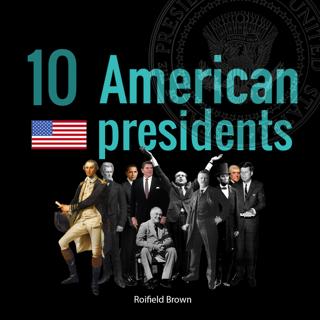
EP: 23 - The Presidents faces - Dan Hill on the emotions of the Commander in Chief
How emotions drive presidents, Roifield talks to Dan Hill on identifying emotional patterns that help to understand three key things about U.S. presidents.Dan Hill, Ph.D., is an internationally recognised expert on the role of emotions in business, politics, sports, and popular culture, and has given keynote speeches in over 20 countries. He's the founder and president of Sensory Logic, Inc., which pioneered the use of facial coding to scientifically capture and quantify emotions in business beginning in 1998 and has in the years since done consulting work for over half of the world's top 100 business-to-consumer (B2C) oriented companies. Dan is the recipient of seven U.S. patents related to facial coding and is also a certified Facial Action Coding System (FACS) practioner. Hosted on Acast. See acast.com/privacy for more information.
27 Mar 20201h 2min

Ep: 22 - The History of Impeachment - Corey Brettschneider
Impeachment is the process by which a legislative body levels charges against a government official. Impeachment does not in itself remove the official definitively from office; it is similar to an indictment in criminal law, and thus it is essentially the statement of charges against the official. Hosted on Acast. See acast.com/privacy for more information.
6 Mar 20201h 42min

Presidents Day Bonus episode - Impeachment
Article One of the United States Constitution gives the House of Representatives the sole power of impeachment and the Senate the sole power to try impeachments of officers of the U.S. federal government. (Various state constitutions include similar measures, allowing the state legislature to impeach the governor or other officials of the state government.) In the United States, impeachment is only the first of two stages, and conviction during the second stage requires "the concurrence of two thirds of the members present" Hosted on Acast. See acast.com/privacy for more information.
17 Feb 202025min

Ep: 21 How the past will predict the 2020 American election - Misha Leybovich
Roifield speaks to tech entrepreneur Misha Leybovich about this theory of the 40 year pattern in American politics and what it tells us about 2020 and 2060. https://medium.com/@mishaley/how-history-predicts-the-2020-election-and-the-next-40-years-1904e6ac19bd Hosted on Acast. See acast.com/privacy for more information.
25 Jan 20201h 14min

Ep: 20 Young Lincoln part 2 with Jonathan F. Putnam
Abraham Lincoln (February 12, 1809 – April 15, 1865) was an American statesman and lawyer who served as the 16th president of the United States from March 1861 until his assassination in April 1865. This episode covers his early life in Springfield. Hosted on Acast. See acast.com/privacy for more information.
7 Okt 20191h 34min

Ep: 19 Young Lincoln part 1 with Jonathan F. Putnam
Abraham Lincoln (February 12, 1809 – April 15, 1865) was an American statesman and lawyer who served as the 16th President of the United States from March 1861 until his assassination in April 1865. Lincoln led the United States through the American Civil War—its bloodiest war and perhaps its greatest moral, constitutional, and political crisis. In doing so, he preserved the Union, abolished slavery, strengthened the federal government, and modernised the economy.Born in Hodgenville, Kentucky, Lincoln grew up on the western frontier in Kentucky and Indiana. Largely self-educated, he became a lawyer in Illinois, a Whig Party leader, and was elected to the Illinois House of Representatives, in which he served for eight years. Hosted on Acast. See acast.com/privacy for more information.
10 Jul 201852min

EP: 18 - Sarada Peri - Speechwriter for President Obama and the naturalization ceremony speech.
Sarada Peri is a speechwriter and communications strategist. She was Special Assistant to the President and Senior Speechwriter for President Barack Obama. Prior to joining the White House, she was a Principal at West Wing Writers, where she worked with corporate, political and nonprofit clients on speechwriting, speech delivery, op-eds, books, and message strategy. She was also a member of the 2012 and 2016 Democratic National Convention speechwriting teams.As the political season heated up in the fall of 2015, the rhetoric against minorities and immigrants got ugly. Many people, including the White House, were concerned and even fearful. So when President Obama was asked to speak at a naturalization ceremony at the National Archives, we speechwriters saw an opportunity. On this episode she discusses the speech she wrote for President Obama and what it meant for her. Hosted on Acast. See acast.com/privacy for more information.
7 Jun 20181h 22min

Ep: 17 Teddy Roosevelt Q and A with David Pietrusza
Steve VGuerra Given that it was a definitely possible that McKinley could have survived, what would have happened to TR?It’s hard not to think that TR would be against some domestic tenants of the Trump administration as he was against Trusts and pro conservation is his reputation as a Trust Buster deserved?Joe Jamsky I mostly just want to know how racist, and religious every president was, his impact on Natives and such?New York Governor Charles Evans Hughes was potentially a candidate to follow TR in 1908 who shared Roosevelt's progressivism, but Roosevelt disliked him and considered him to be too independent, why?The 1912 primaries represented the first extensive use of the presidential primary, why was this important for the progressive movement?Why did TR run as a third party candidate in 1912?Brent Hamoud What role did Elliot play?Niall Gargan I'd be interested to know a bit more about TR's relationship with FDR. Mostly looking at the reason why they are from opposing political parties. I know the old story that FDR ran as a Democrat simply because he said they asked to run for them in the state senate. I'm wondering how true this is or if the two family factions had a bigger part. I would have thought that FDR would have followed the same political ideology or had TR's troubles with the Republican Party in latter year dissuaded him from joining them?James R. Early If Roosevelt had survived long enough to run for president in 1920, do you think he would have won?If he had won in 1920 would he have continued the US isolationist policy after WW1?Joe Jamsky I would be curious to know if Roosevelt said anything interesting about the second amendment?Joe Jamsky Which president would win a WWE royal rumble?Brent Hamoud have we overlooked TR’s mind?Adam Vonnahme When was he happiest?Adam Vonnahme What was his legacy? Hosted on Acast. See acast.com/privacy for more information.
21 Apr 20181h 13min





















